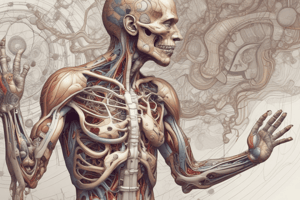Podcast
Questions and Answers
The process of ______ involves the breakdown of nutrients into smaller molecules.
The process of ______ involves the breakdown of nutrients into smaller molecules.
digestion
The ______ is responsible for filtering and regulating blood sugar levels in the body.
The ______ is responsible for filtering and regulating blood sugar levels in the body.
liver
The ______ system is responsible for exchanging oxygen and carbon dioxide in the body.
The ______ system is responsible for exchanging oxygen and carbon dioxide in the body.
respiratory
The ______ is a type of disease that occurs when the arteries become narrowed and hardened.
The ______ is a type of disease that occurs when the arteries become narrowed and hardened.
The ______ is a vital process that helps maintain a stable internal environment in the body.
The ______ is a vital process that helps maintain a stable internal environment in the body.
What is the significance of the double circulation system in the heart, and how does it contribute to the efficient exchange of oxygen and carbon dioxide in the body?
What is the significance of the double circulation system in the heart, and how does it contribute to the efficient exchange of oxygen and carbon dioxide in the body?
Describe the role of enzymes in the digestive process, and explain how they are specifically tailored to function optimally in different regions of the digestive tract.
Describe the role of enzymes in the digestive process, and explain how they are specifically tailored to function optimally in different regions of the digestive tract.
Compare and contrast the mechanisms of gas exchange in alveoli and the mechanism of breathing in the human respiratory system.
Compare and contrast the mechanisms of gas exchange in alveoli and the mechanism of breathing in the human respiratory system.
Explain the role of the liver and pancreas in regulating blood sugar levels, and describe the consequences of impaired regulation in diabetes.
Explain the role of the liver and pancreas in regulating blood sugar levels, and describe the consequences of impaired regulation in diabetes.
Describe the mechanisms of atherosclerosis and its role in the development of coronary heart disease (CHD).
Describe the mechanisms of atherosclerosis and its role in the development of coronary heart disease (CHD).
Flashcards are hidden until you start studying




